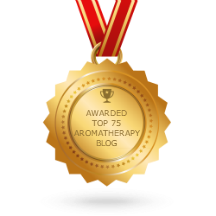Reflecting on the busy and interesting year of 2011, I am grateful for many
new aromatic endeavors as a professional certified and registered aromatherapist.
One of the most interesting and productive efforts this year was working in conjunction with the Continuing Education Institute of Illinois, and Dr. William Gingold.
Dr. Gingold is a true visionary in advancing the health and wellness of the senior population. He is currently the Director of Family Medicine Research and Aging at the University of Illinois
With the support and help of Marge Clark, Sylla Sheppard Hanger, and Kelly Holland Azzaro we determined essential and natural oils appropriate for the odor domains required to work in conjunction with the Hennings Smell Prism. The odor
domains required: flowery, fruity, spicy, resinous, foul and burnt odors. Marge was a great help in providing me with birch tar samples for our burnt odor and it was a perfect choice!
The other odor domains were much easier to select. Those of you who work with essential oils know that we have volumes of flowery, fruity, resinous, and spicy odors to choose from and so these choices were not as challenging. When I last saw Dr. Gingold in October he said, “ the aromatic inhalers were lasting longer than anticipated and that the research was going well”. I look forward to participating in this research as it continues and anticipate that this new information could profoundly change the way many dementia related health issues are diagnosed. It makes perfect sense that the olfactory receptors which are high inside the nasal cavity with as many as 10,000,000 cells and are responsible for relaying important messages to the brain could be a significant piece of the dementia puzzle. Exciting opportunities like this offer tremendous satisfaction in the field of Aromatherapy, which most people incorrectly associate with just perfume and pleasant odors.
Another blessing this year was the opportunity to meet and chat with Cynthia Loving of Loving Scents. I met with Cynthia at this years Alliance of International Aromatherapist Convention in Minneapolis , MN
So my prayer for 2012 would be that through the use of clinical aromatherapy that all aromatherapists may be involved in moving aromatherapy forward into more health, research and educational venues that will bless our planet, our people and all living things. “ Be the change you wish to see in the world” ghandi
Thanks and Blessings, Sara
Sara Holmes BS RA LMT NCTMB



2 comments:
My mother has had Alzheimer's disease for seven years. Four years ago, my sisters and I began to treat her with aromatherapy using rosemary essential oil. Last year, we added clove, thyme, oregano, sage, peppermint, laurel, and orange essential oils. She now recognizes her home again, she feels comfortable around her brother (who she used to think was an impostor), she sleeps through the night, she can count to ten and recite the alphabet, she can remember her name and sometimes spell it, and she is much more alert and aware than she was four years ago. Methoxyphenols and perhaps limonene partially reverse the peroxynitrite oxidation of g protein-coupled receptors (by adding hydrogen back to these receptors) involved in short-term memory (muscarinic acetylcholine), mood (serotonin and opioid), sleep (melatonin) social recognition (oxytocin), alertness (dopamine), and smell (olfactory). They also promote the regeneration of neurons in the hippocampus, scavenge peroxynitrites (convert them into water and a nitrogen dixoide anion), and they inhibit the release of glutamate and the influx of calcium (also caused by peroxynitrites) which kills neurons. There is an urgent need to follow up on animal studies, case studies, and clinical trials (by Jimbo and Akhondzadeh, for instance) that have indicated that aromatherapy/essential oils provide an effective treatment for Alzheimer's disease. Please share this information with your colleagues if you can.
Lane I'm going to make sure several clinicians working in the field are aware of what you posted... thank you for sharing!!!
Post a Comment